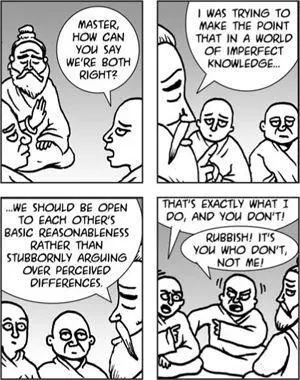Tan, Chade-Meng - Search Inside Yourself - The Unexpected Path to Achieving Success, Happiness (and World Peace)
Здесь есть возможность читать онлайн «Tan, Chade-Meng - Search Inside Yourself - The Unexpected Path to Achieving Success, Happiness (and World Peace)» — ознакомительный отрывок электронной книги совершенно бесплатно, а после прочтения отрывка купить полную версию. В некоторых случаях можно слушать аудио, скачать через торрент в формате fb2 и присутствует краткое содержание. Год выпуска: 2012, Издательство: Harper Collins, Inc., Жанр: Старинная литература, на английском языке. Описание произведения, (предисловие) а так же отзывы посетителей доступны на портале библиотеки ЛибКат.
- Название:Search Inside Yourself: The Unexpected Path to Achieving Success, Happiness (and World Peace)
- Автор:
- Издательство:Harper Collins, Inc.
- Жанр:
- Год:2012
- ISBN:нет данных
- Рейтинг книги:4 / 5. Голосов: 1
-
Избранное:Добавить в избранное
- Отзывы:
-
Ваша оценка:
- 80
- 1
- 2
- 3
- 4
- 5
Search Inside Yourself: The Unexpected Path to Achieving Success, Happiness (and World Peace): краткое содержание, описание и аннотация
Предлагаем к чтению аннотацию, описание, краткое содержание или предисловие (зависит от того, что написал сам автор книги «Search Inside Yourself: The Unexpected Path to Achieving Success, Happiness (and World Peace)»). Если вы не нашли необходимую информацию о книге — напишите в комментариях, мы постараемся отыскать её.
Search Inside Yourself: The Unexpected Path to Achieving Success, Happiness (and World Peace) — читать онлайн ознакомительный отрывок
Ниже представлен текст книги, разбитый по страницам. Система сохранения места последней прочитанной страницы, позволяет с удобством читать онлайн бесплатно книгу «Search Inside Yourself: The Unexpected Path to Achieving Success, Happiness (and World Peace)», без необходимости каждый раз заново искать на чём Вы остановились. Поставьте закладку, и сможете в любой момент перейти на страницу, на которой закончили чтение.
Интервал:
Закладка:
In studies by Claudia Mueller and Carol Dweck, fifth-grade students were given a problem-solving task engineered to guarantee high performance, and the students were praised for their success. 11Some students were praised for their intelligence (“person praise”: “You must be smart at these problems”), some were praised for their effort (“process praise”: “You must have worked hard at these problems”), and the remaining students, the control group, were simply told their scores were very high. Later, on a subsequent set of harder problems, those praised for being smart performed significantly worse than the other groups, while those praised for their effort significantly outperformed the other groups. Being praised for being smart is bad for you.
The explanation offered by researchers in these and related studies is that when a person is given person praise, it reinforces a “fixed mind-set,” or the belief that our success is due to fixed traits that are a given. People in this mind-set worry about their traits. They also worry about how adequate or inadequate they might be. When they fail, they attribute it to personal inadequacy. They are afraid to take risks when failure may show them to be inadequate. In contrast, when a person is given process praise, it reinforces a “growth mind-set,” or the belief that our qualities can be developed through dedication and effort, and therefore that success comes from dedication and effort. This creates a love of learning and resilience that is essential for great accomplishment. 12
Thus, when giving feedback, it is best to do so in a way that encourages a growth mind-set. It is better to structure feedback around effort and growth than by labeling the person.
Simply put, it’s better to praise people for working hard than for being smart. Oh, and thank you for reading this book. You must have worked hard at it. Good effort!

Political Awareness Is Empathy++
Now that we have learned empathy skills for one-on-one interactions, it is time to up our game to a more difficult skill: the ability to read an organization’s emotional currents and power relationships. The common name for this skill is “political awareness.”
Political awareness is one of the most useful skills you can equip yourself with in any organization. Happily, this skill is not foreign to a practitioner of empathy because, in a sense, political awareness is the generalization of empathy from an interpersonal level to an organizational level. Daniel Goleman describes it this way:
Every organization has its own invisible nervous system of connection and influence.... Some people are oblivious to this below-the-radar world, while others have it fully on their own screen. Skill at reading the currents that influence the real decision-makers depends on the ability to empathize on an organizational level, not just an interpersonal one . 13
Another way to look at it—in “plain vanilla” empathy—you understand the feelings, needs, and concerns of individual people. In political awareness, you understand the feelings, needs, and concerns of individual people and how those feelings, needs, and concerns interact with those of others and how that all weaves into the emotional fabric of the organization as a whole. There are a lot more variables to understand in political awareness, but the basic skill required is the same.
If you understand people and you understand the interactions between them, you will understand the whole organization. That is political awareness.
Practices for Political Awareness
On top of the (plain vanilla) empathy practices already mentioned in this chapter, there are other useful practices for developing political awareness. My wise friend Marc Lesser recommends the practices below based on his many years of experience being a CEO and executive coach.
1. Maintain rich personal networks within your organization, especially with allies, mentors, and groups who will support and challenge you. To do this, care about people, help people, and nurture relationships. Pay attention to one-on-one relationships, as well as relationships with key groups—your team, other management teams, customers, stakeholders, etc.
2. Practice reading the underlying currents of your organization. Understand how decisions are made. Are decisions made by authority or consensus? Who are most influential in making them?
3. Distinguish between your own self-interest, the interest of your team, and the organization’s interest—everyone has all three of these interests. It is very important to understand which is which.
4. Utilize your self-awareness to better understand your role in the web of personalities and interactions. Make frequent use of empathic listening to understand how people feel about situations and about each other.
Here is an exercise to help you increase political awareness.
POLITICAL AWARENESS EXERCISE
You may do this as either a writing exercise or a speaking exercise. If you do this as a speaking exercise, you may speak to a friend.
Instructions
1. Think of a difficult situation from your present or past, when there was some conflict or disagreement, something real, something that has some meaning and potency for you.
2. Describe the situation as though you are 100 percent correct and reasonable. Do that either in writing or by talking about it in a monologue.
3. Now describe the situation as though the other person is (or the other people are) 100 percent correct and reasonable. Do that either in writing or by talking about it in a monologue.
If you did this as a speaking exercise with a friend, discuss the contents of your monologues in a free-flow conversation.
The main purpose of this exercise is to practice seeing the perspectives of different players (in this case, yourself and another party) objectively. You may notice that the instructions were worded very carefully. The key learning point (that is, the kicker) is the insight that the stories in steps two and three can very often be precisely the same story. In other words, conflict does not always arise because one side is wrong or unreasonable. It is entirely possible for both sides to be 100 percent correct and 100 percent reasonable and still have conflict.
There are many reasons why this can happen. One common reason is that people implicitly value different priorities. For example, one engineer might place higher priority on meeting the delivery schedule, as she might think it is better to deliver a promised product on time even if it means cutting down the number of features. Another engineer might place higher priority on completeness of delivery, as he might think it is better to give the customer everything he was promised the first time, even if it means delivering late. In this case, they may each be correct and reasonable, and still they may get into an unending disagreement, unless each is able to understand and internalize the other’s implicit priorities.
Another common reason is that we have incomplete data, which happens a lot in real life, and we all have our own reasonable ways of filling in the missing pieces. For example, let’s say we are presented with a large business opportunity that can easily double or triple our revenue in a few years, but it requires us to make a large investment that exceeds our current net assets. Is this opportunity so compelling we have to do it, or is it so risky it will bankrupt us? Nobody can possibly know for sure, because nobody can know in advance how many new customers it will actually bring in each year. We can only give our best guess. In such situations, it is possible to have huge disagreements in which both sides are correct and reasonable. These disagreements will remain unresolved until people assume that the other is reasonable and become open to each other’s implicit assumptions.
Читать дальшеИнтервал:
Закладка:
Похожие книги на «Search Inside Yourself: The Unexpected Path to Achieving Success, Happiness (and World Peace)»
Представляем Вашему вниманию похожие книги на «Search Inside Yourself: The Unexpected Path to Achieving Success, Happiness (and World Peace)» списком для выбора. Мы отобрали схожую по названию и смыслу литературу в надежде предоставить читателям больше вариантов отыскать новые, интересные, ещё непрочитанные произведения.
Обсуждение, отзывы о книге «Search Inside Yourself: The Unexpected Path to Achieving Success, Happiness (and World Peace)» и просто собственные мнения читателей. Оставьте ваши комментарии, напишите, что Вы думаете о произведении, его смысле или главных героях. Укажите что конкретно понравилось, а что нет, и почему Вы так считаете.







![Chade-Meng Tan - Search Inside Yourself - Increase Productivity, Creativity and Happiness [ePub edition]](/books/703803/chade-thumb.webp)



